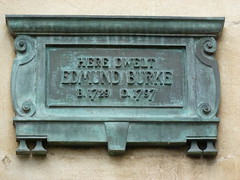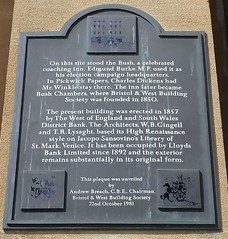Edmund Burke
Commemorated on 3 plaques
Edmund Burke, author and statesman, lived here b.1729, d.1797
37 Gerrard Street, Westminster, W1, London, United Kingdom where they lived
On this site stood The Bush, a celebrated coaching inn. Edmund Burke M.P. used it as his election campaign headquarters. In Pickwick Papers, Charles Dickens had Mr. Winkle stay there. The inn later became Bush Chambers, where Bristol & West Building Society was founded in 1850. The present building was erected in 1857 by The West of England and South Wales District Bank. The Architects W. B. Gingell and T. R. Lysaght based its High Renaissance style on Jacopo Sansovino's Library of St. Mark, Venice. It has been occupied by Lloyds Bank Limited since 1892 and the exterior remains substantially in its original form.
Corn Street, Bristol, United Kingdom where they worked




